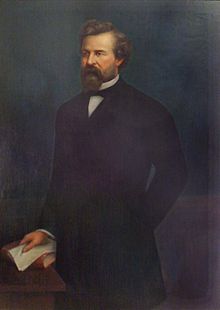George Wythe McCook
George Wythe McCook (born November 21, 1821 in Canonsburg , Pennsylvania , † December 28, 1877 in Steubenville , Ohio ) was an American lawyer , officer and politician ( Democratic Party ). He was Attorney General of Ohio from 1854 to 1856 . He was also part of the Fighting McCooks , a famous military family that provided more than a dozen officers during the Civil War .
Early years
George Wythe McCook, son of Martha Latimer (1802–1879) and Attorney Daniel McCook , was born in Washington County in 1821 . He was one of twelve children. There were nine boys and three girls. The family moved to Ohio in 1826 and settled there first in New Lisbon ( Columbiana County ) and later in Carrollton ( Carroll County ). He graduated from Ohio University . He then studied law with Edwin M. Stanton and then became his partner. The economic crisis of 1837 overshadowed the following years. During the Mexican-American War he served as an officer in the 3rd Infantry Regiment of Ohio. At the end of the war he was its commander.
Between 1854 and 1856 he was Attorney General of Ohio, during which time he edited the first volume of Ohio State Reports . During his tenure he specialized in railway law. His ability in the field drew the attention of the Steubenville and Indiana Railroad Company to him. After his tenure, the company sent him to Europe for legal transactions.
McCook took as a delegate at the 1860 Democratic National Convention in Charleston ( South Carolina part).
Civil war
At the beginning of the war, Ohio Governor William Dennison Jr. appointed him and three others to the first brigadier generals of Ohio to lead the state troops, but due to his poor health, which was a result of his service in Mexico , McCook could not accept the appointment. He was later promoted to lieutenant colonel in the Ohio 2nd Infantry Regiment. He then spent much of his time recruiting volunteers for new regiments. Governor William Dennison then named him Adjutant General of Ohio. He was later promoted to colonel in the Ohio 157th Infantry Regiment ( Hundred Days Regiment ). He was the deputy commanding officer of the prisoner-of-war camp in Fort Delaware . On March 13, 1865, he was appointed Brevet Brigadier General.
Late years
After the end of the war he resumed his work as a lawyer, but continued to pursue a political career. In 1871 he ran for governor of Ohio. He lost the election to a former Union Army officer Colonel Edward F. Noyes with more than twenty thousand votes.
McCook and Reverend Dr. Charles Beatty were the largest donors in building the Second Presbyterian Church in Steubenville, where he served as a trustee . He died there and was then buried in Union Cemetery .
Individual evidence
- ↑ a b The Fighting McCooks ( Memento of the original from July 5, 2008 in the Internet Archive ) Info: The archive link was inserted automatically and has not yet been checked. Please check the original and archive link according to the instructions and then remove this notice.
- ↑ Martha Latimer McCook in the Find a Grave database . Retrieved May 23, 2015.
- ^ Daniel McCook in the Find a Grave database . Retrieved May 23, 2015.
- ↑ George Wythe McCook on the Virtual American Biographies website
- ^ Office of the Ohio Attorney General
- ^ Cincinnati Civil War Round Table
- ↑ George Wythe McCook on The Political Graveyard website
- ↑ George Wythe McCook in the Find a Grave database . Retrieved May 23, 2015.
| personal data | |
|---|---|
| SURNAME | McCook, George Wythe |
| BRIEF DESCRIPTION | American lawyer, officer and politician |
| DATE OF BIRTH | November 21, 1821 |
| PLACE OF BIRTH | Canonsburg , Pennsylvania |
| DATE OF DEATH | December 28, 1877 |
| Place of death | Steubenville , Ohio |

